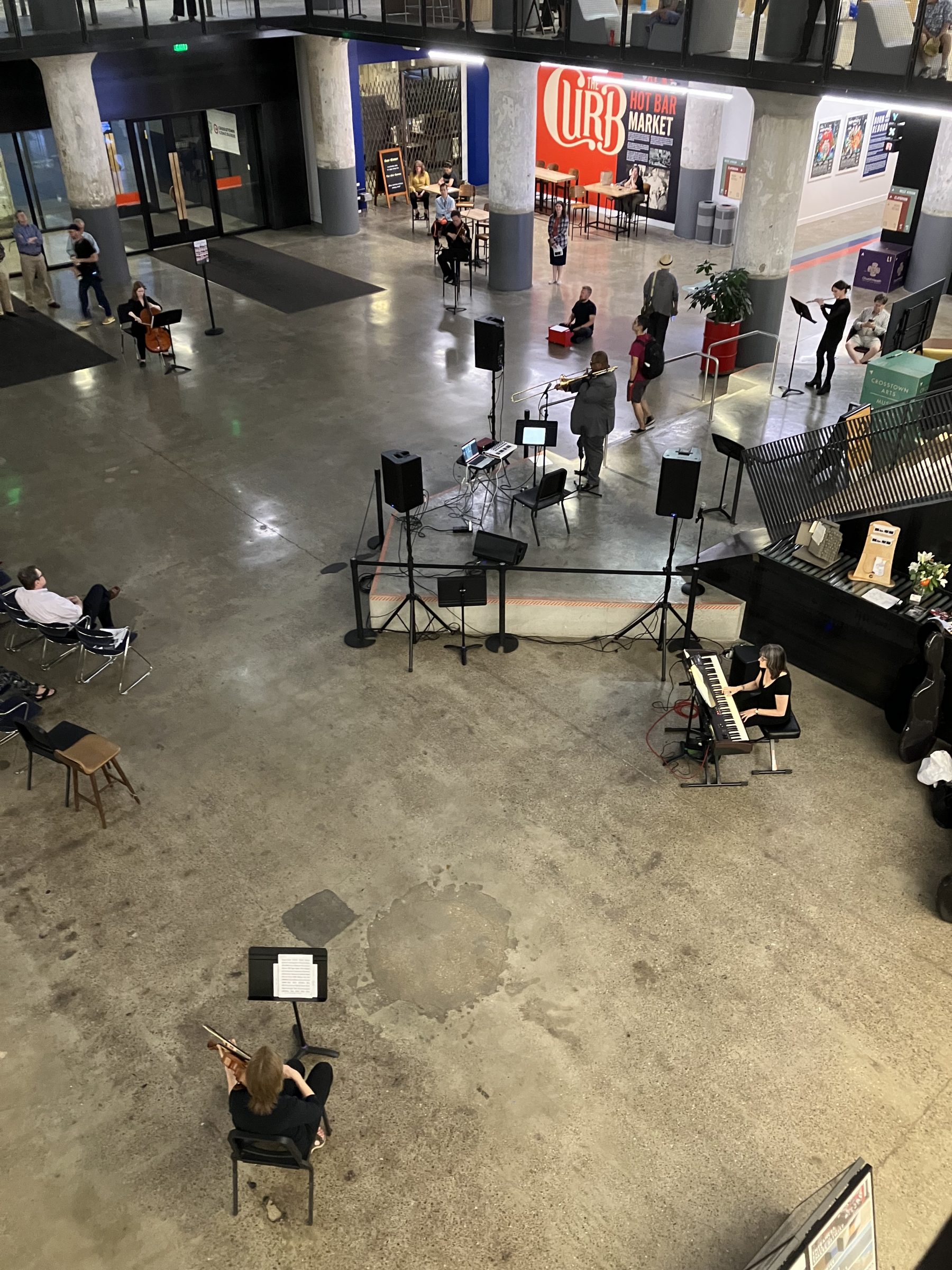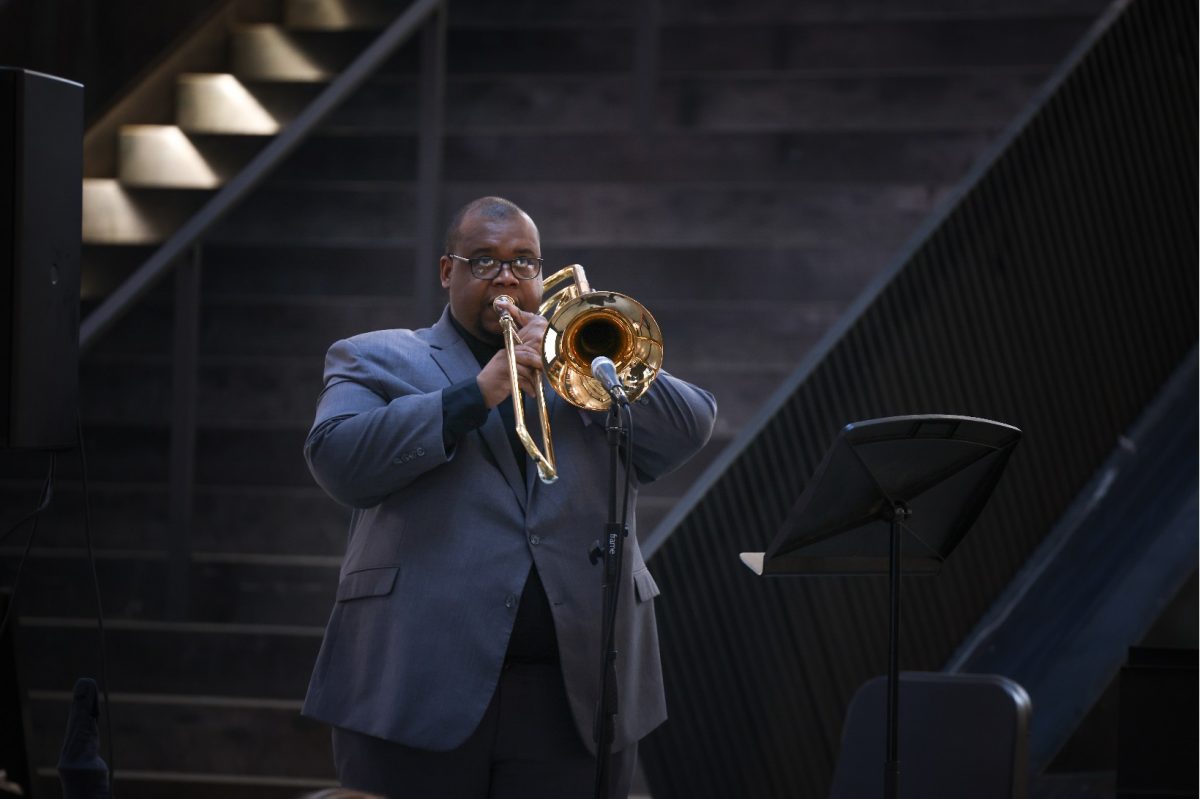New Music composer Evan Williams is no stranger to Memphis, having lived and taught here from 2018-22. And, as he noted in his remarks in the Crosstown Concourse East Atrium last night, his time as a assistant professor of music and director of instrumental activities at Rhodes College made an indelible impression on him. Indeed, Wednesday evening’s premiere of his new work, Crosstown Counterpoint, was a deep rumination on that iconic space and its place in the city’s history.
But that multi-movement suite was book-ended and contextualized by other pieces that helped situate Crosstown in time and space. Williams began with a trombone solo titled Amber Waves, in honor of the semi-rural Chicago suburb where he grew up. His use of delay effects only added to the natural reverberation of the towering atrium, with its echoing brass tones reminiscent of Sean Murphy’s Sketches of Crosstown from 10 years ago, featuring tuba and saxophone in the abandoned Sears Tower, pre-renovation.
A more activist and avant garde note was struck by the evening’s second piece, Bodies Upon the Gears, a celebration of public protest and engagement via the words Mario Savio spoke on the University of California-Berkeley campus in 1964:
There’s a time when the operation of the machine becomes so odious, it makes you so sick at heart that you can’t take part! You can’t even passively take part! And you’ve got to put your bodies upon the gears and upon the wheels, upon the levers, upon all the apparatus — and you’ve got to make it stop!
Historical recordings of Savio’s words were woven into a duet for flute and cello, and, echoing through the cavernous space of Crosstown, the combination served to remind listeners of the political and aesthetic dimensions of such a public commons, and the citizens’ duty to make good on any promise that such a space implies.
And then came the centerpiece of the evening, taking place within the very space it celebrated. Subtitled “for two antiphonal string quartets and audio playback,” Crosstown Counterpoint and Memphis’ own Blueshift Ensemble made use of the concourse’s multiple levels, with one quartet on the ground floor and another on the mezzanine above. The sound of stereo strings responding to each others’ hypnotic patterns evoked the origins of Sears, Roebuck and Company’s founder, Richard Warren Sears, in the railroad business; and as recordings of voices were heard on the P.A., the effect was reminiscent of Steve Reich’s Different Trains. But the voices’ stories were closer to home.
Those voices, originally recorded for the Crosstown Concourse Breaking Ground Oral Histories Project, were provided to Williams by Crosstown Arts, and recounted decades of history, from the original Sears department store to its demise and abandonment, and finally its rebirth. In one moving passage, a Memphian observes, “The building has a personality,” then adds, “and layers of history,” a phrase which repeated as the strings played on, the words echoing through the very walls being remembered.
Throughout the proceedings, it was as if the atrium itself was an instrument, its reverberations throwing the composer’s sounds back at us in real time. When Crosstown Counterpoint concluded, Williams then led an expanded ensemble through a classic of the modern classical canon, Terry Riley’s In C.

This piece was also well-suited to the space, full of cascading, contrasting patterns played by various musicians scattered strategically throughout the atrium, on multiple levels. The slightly out of sync parts would ebb and flow, harmonizing with each other in unpredictable ways. Though considered groundbreaking when it premiered in 1964, the piece is not often heard in Memphis, though Williams noted that he led a group through the piece during his time at Rhodes.
In this case, the ever-shifting piece held the crowd’s attention for nearly a half hour, as audience members wandered through the atrium, sampling the sounds from different niches of the concourse. It was met with a standing ovation and raucous cheering as the evening came to end, the reborn vertical village of Crosstown still resonating with its own history.
